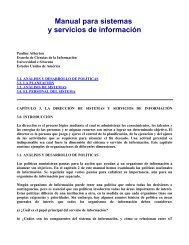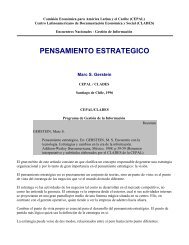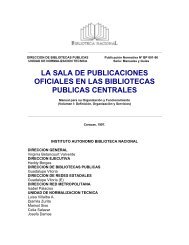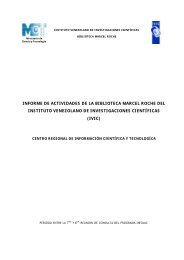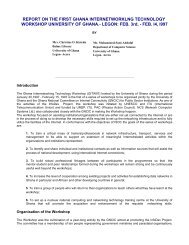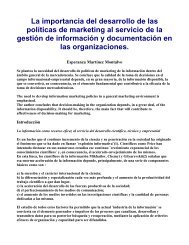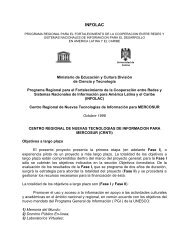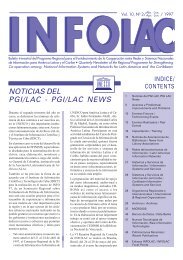universal access to information and informatics - Infolac
universal access to information and informatics - Infolac
universal access to information and informatics - Infolac
You also want an ePaper? Increase the reach of your titles
YUMPU automatically turns print PDFs into web optimized ePapers that Google loves.
Panel on<br />
"UNIVERSAL ACCESS TO INFORMATION AND INFORMATICS<br />
FOR HUMAN DEVELOPMENT"<br />
organized under the aegis of UNESCO<br />
at the Economic <strong>and</strong> Social Council of the United Nations (ECOSOC)<br />
New York, 10 May 2000-06-12<br />
Summary of Presentations<br />
An open <strong>and</strong> <strong>universal</strong> Information Society can only develop <strong>and</strong> subsist if it is based on basic<br />
policy principles unders<strong>to</strong>od by all. Universal <strong>access</strong> <strong>to</strong> the new <strong>information</strong> services <strong>and</strong> media<br />
is in many minds the most important of these principles, <strong>and</strong> is implicitly embodied in the<br />
Universal Declaration of Human Rights, particularly Article 19 bearing on freedom of expression<br />
<strong>and</strong> Article 27 relating <strong>to</strong> freedom of <strong>access</strong> <strong>to</strong> <strong>information</strong> <strong>and</strong> protection of users' security <strong>and</strong><br />
privacy.<br />
Governments, industry <strong>and</strong> the civil society are seeking <strong>to</strong> apply these long accepted principles<br />
<strong>to</strong> the electronic <strong>information</strong> environment, but these efforts are hampered by major difficulties<br />
<strong>and</strong> challenges, including the critical issue of how <strong>to</strong> ensure fair conditions for the developing<br />
countries which are entering the digital age at a major disadvantage.<br />
At the same time, however, most of the national <strong>and</strong> international debates seem <strong>to</strong> be<br />
concentrating on the technological <strong>and</strong> economic aspects of <strong>information</strong> <strong>and</strong> communication<br />
technologies (ICTs), because of their more immediate perceived impact, perhaps <strong>to</strong> the<br />
detriment of the others which will ultimately have a deeper, more fundamental significance in<br />
achieving an Information Society for All. We therefore feel that this panel is a particularly timely<br />
forum <strong>to</strong> explore the "right of <strong>access</strong> <strong>to</strong> <strong>information</strong>" <strong>and</strong> national <strong>and</strong> international strategies by<br />
which <strong>information</strong> <strong>and</strong> knowledge resources can be developed as a global public good,<br />
stressing important "infoethical" issues.<br />
Access <strong>to</strong> networks <strong>and</strong> services:<br />
At the most basic level, <strong>universal</strong> <strong>access</strong> means ensuring all citizens <strong>access</strong> <strong>to</strong><br />
telecommunication services <strong>and</strong> other ICT facilities. Disparities <strong>and</strong> inequalities in Internet<br />
<strong>access</strong> - now commonly referred <strong>to</strong> as the "digital divide" - are considerable, particularly in<br />
developing countries where the Internet is most often far <strong>to</strong>o expensive <strong>to</strong> be <strong>access</strong>ible <strong>to</strong><br />
ordinary citizens <strong>and</strong> most public service institutions <strong>and</strong> is often available only in major<br />
population centres.<br />
One must clearly distinguish in this context, even if they are "bundled" for the end user, the case<br />
of Internet service connections, for which there is no regulation at the international level, <strong>and</strong><br />
that of <strong>access</strong> <strong>to</strong> the underlying telecommunication channels which falls within the regula<strong>to</strong>ry<br />
framework developed by the International Telecommunication Union (ITU).<br />
In the telecom area, with the mounting pressure <strong>to</strong> abolish bilaterally negotiated cost sharing<br />
arrangements (the so-called "accounting rate" system of the ITU), developing countries will face<br />
an unprecedented burden <strong>to</strong> maintain their telecommunication systems. The net result of this<br />
"rate re-balancing" is that the telecommunication opera<strong>to</strong>rs in developing countries will be
forced <strong>to</strong> offset the costs by increasing their national call charges which are often already very<br />
high relative <strong>to</strong> local means, particularly in rural areas, thus placing further constraints on<br />
<strong>access</strong> <strong>to</strong> knowledge resources for disadvantaged populations. Solutions require balanced<br />
consideration by national <strong>and</strong> international regula<strong>to</strong>rs since the telecom privatisation <strong>and</strong><br />
deregulation movement which is at the root of the these tendencies is also enabling many<br />
consumers in developing countries <strong>to</strong> <strong>access</strong> the Internet by leased line <strong>and</strong> dial-up <strong>access</strong> at<br />
reasonable prices, especially where monopoly public telecommunication opera<strong>to</strong>rs had been<br />
inefficient or did not reinvest their high profits in infrastructure <strong>to</strong> improve <strong>access</strong>.<br />
In another, but related, development, advanced technology, high speed Internet backbones <strong>and</strong><br />
powerful network nodes, built up over a period of time, have led <strong>to</strong> an overwhelming<br />
concentration of Internet backbone business in one country, the USA. Currently, even for intra-<br />
European networks, local Internet service providers (ISPs) often use Virginia as their<br />
international Internet hub, <strong>and</strong> the majority of ISPs in developing countries are linked <strong>to</strong> the USbased<br />
opera<strong>to</strong>rs for intra-regional <strong>and</strong> sometimes even national, traffic. ISPs outside the USA<br />
must in most cases pay the entire costs of these two-way links, <strong>and</strong> ironically, under these<br />
circumstances, even the poorest countries are obliged <strong>to</strong> subsidize the Internet providers <strong>and</strong><br />
users in the United States.<br />
What redeeming measures are available <strong>to</strong> developing countries? In this connection, the issue<br />
of strengthening intra-regional networks, combining commercial <strong>and</strong> public service traffic, has <strong>to</strong><br />
be brought forward high on the agendas of regional forums. Serious thought should be given <strong>to</strong><br />
the possibility of establishing high capacity regional backbones <strong>to</strong> connect each country within a<br />
multi-hub global network in which nobody dominates connectivity - as is already under<br />
consideration, for example, within the Asia Pacific Economic Cooperation (APEC) forum.<br />
Public service institutions in many developing countries - universities, research centres,<br />
libraries, museums, NGOs <strong>and</strong> government agencies - are facing special difficulties in<br />
participating in the <strong>information</strong> revolution because of economic <strong>and</strong> associated obstacles <strong>to</strong><br />
<strong>access</strong>, particularly where the Internet has been developed mainly on a commercial basis as<br />
opposed <strong>to</strong> the situation in the industrialized countries where its origin was as a service <strong>to</strong> the<br />
academic <strong>and</strong> research communities. The general idea of a "public service sec<strong>to</strong>r ICT<br />
consortium" can be useful in ensuring the <strong>access</strong> of public service institutions <strong>to</strong> networks <strong>and</strong><br />
services. Such a consortium relies on the principle of self-help, drawing on the strengths of the<br />
different institutions <strong>to</strong> consolidate dem<strong>and</strong> for services, <strong>to</strong> promote appropriate public policies,<br />
<strong>and</strong> <strong>to</strong> provide cost-effective support for training, infrastructure <strong>and</strong> content development. This<br />
approach is not about duplicating facilities of the private sec<strong>to</strong>r, but rather about<br />
complementarity <strong>and</strong> co-operation between the public <strong>and</strong> private sec<strong>to</strong>rs <strong>to</strong> ensure<br />
improvements in public services through ICTs. Public service sec<strong>to</strong>r consortia can take many<br />
forms. One model which has been promoted by UNESCO <strong>and</strong> other UN agencies is the<br />
multipurpose community telecentre (MCT) - a shared, sustainable facility empowering local<br />
communities <strong>to</strong> service their <strong>information</strong> <strong>and</strong> ICT requirements <strong>to</strong> improve literacy campaigns,<br />
basic <strong>and</strong> non-formal education, government programmes <strong>and</strong> participa<strong>to</strong>ry development<br />
action, all within the framework of a viable business plan. The basic justification <strong>and</strong> strategies<br />
for public service sec<strong>to</strong>r consortia were developed some years ago in a joint study of the ITU<br />
<strong>and</strong> UNESCO1, but need <strong>to</strong> be reviewed <strong>and</strong> updated in view of new developments in<br />
technologies <strong>and</strong> networks.<br />
1 ITU <strong>and</strong> UNESCO. The Right <strong>to</strong> Communicate - At What Price? Economic Constraints <strong>to</strong> the Effective Use of<br />
Telecommunications in Education, Science, Culture <strong>and</strong> in the Circulation of Information. UNESCO, Paris: May<br />
1995 (CII-95/WS/2).
National authorities, telecommunication opera<strong>to</strong>rs <strong>and</strong> ISPs could promote development <strong>and</strong><br />
future markets by establishing concessionary rates for Internet <strong>access</strong> in public service<br />
institutions such as schools, academic organizations <strong>and</strong> public libraries. Such schemes,<br />
sometimes known as "e-rates" have been successfully promoted by governments <strong>and</strong><br />
regula<strong>to</strong>ry agencies in several countries, most notably the USA. The idea of an "Internet tax"<br />
has been proposed in various forms <strong>and</strong> forums <strong>to</strong> the cross-subsidization necessary <strong>to</strong> ensure<br />
<strong>universal</strong> <strong>access</strong> <strong>to</strong> the Internet.<br />
Access <strong>to</strong> <strong>and</strong> production of content<br />
Perhaps even more important than physical <strong>access</strong> <strong>to</strong> telematics facilities is <strong>universal</strong> <strong>access</strong> <strong>to</strong><br />
knowledge content, which is at the root of building a "Knowledge Society" based upon lifelong<br />
learning <strong>and</strong> basic human values <strong>and</strong> rights. Education <strong>and</strong> knowledge must be considered in<br />
this context as not simply advantages for personal <strong>and</strong> professional fulfilment, but also as social<br />
capital - "global public goods" which are the natural concern of public authorities as developed<br />
in a very interesting recent publication of UNDP.2<br />
The knowledge base for the future knowledge economy is being developed largely through<br />
publicly funded instruments such as universities <strong>and</strong> research grants, while the exploitation of<br />
knowledge <strong>to</strong> produce products has become mainly a concern of private industry. While it is true<br />
that industries increasingly do their own product research, it is also true that the publicly funded<br />
institutions produce the researchers, <strong>and</strong> publicly funded academic institutes continue <strong>to</strong> be the<br />
fountain of knowledge. Then who should own the knowledge? Shouldn't there be a fair <strong>access</strong><br />
<strong>to</strong> knowledge produced by both private <strong>and</strong> public enterprises, with due regard <strong>to</strong> the intellectual<br />
property rights? For instance, genome <strong>information</strong> sequences have been developed naturally<br />
through millions of years of evolution. Should a private owner become the sole proprie<strong>to</strong>r of<br />
such <strong>information</strong>? Shouldn't there be an obligation <strong>to</strong> share that <strong>information</strong> with public bodies<br />
who could be entrusted <strong>to</strong> manage <strong>and</strong> <strong>to</strong> share it as a part of human knowledge base? The<br />
challenge is <strong>to</strong> define new concepts <strong>and</strong> frameworks <strong>to</strong> promote the common public welfare<br />
while encouraging private initiative <strong>and</strong> protecting rightful economic interests.<br />
A key concept in this strategy is that of the electronic public domain - <strong>information</strong> free of<br />
copyright including classical literature, fundamental <strong>and</strong> indigenous knowledge, <strong>and</strong> the<br />
<strong>information</strong> <strong>and</strong> data of governments or produced with public funds at the national <strong>and</strong><br />
international levels - which represents a vast world documentary heritage <strong>access</strong>ible <strong>to</strong> all, a<br />
window on national cultures <strong>and</strong> an invaluable support for education <strong>and</strong> cultural industries in<br />
developing countries. Paradoxically, public domain <strong>information</strong>, which is free of copyright <strong>and</strong><br />
belongs <strong>to</strong> everybody, is often not well enough known <strong>to</strong> potential contribu<strong>to</strong>rs <strong>and</strong> users<br />
because of lack of interest in promoting it, no direct profit being expected due its very "public"<br />
nature. In order <strong>to</strong> ensure effective management of <strong>and</strong> <strong>access</strong> <strong>to</strong> this knowledge, the principles<br />
of free <strong>access</strong> <strong>to</strong> <strong>information</strong> in the public domain will have <strong>to</strong> be defined <strong>and</strong> promoted through<br />
appropriate public policies <strong>and</strong> international agreements, <strong>and</strong> the necessary public service<br />
infrastructures such as virtual libraries <strong>and</strong> archives appropriately developed.<br />
2 Kaul, Inge, Isabelle Grunberg <strong>and</strong> Marc A. Stern (Eds.).Global Public Goods: International Cooperation in the<br />
21st Century. Oxford University Press, 1999 (excerpt available at http://www.undp.org/globalpublicgoods/).
Another important consideration is that of "fair use" of protected <strong>information</strong> <strong>and</strong> knowledge.<br />
Current law <strong>and</strong> practice generally allow free use of published <strong>information</strong> for research, study,<br />
reviewing <strong>and</strong> reporting, <strong>and</strong> fair <strong>access</strong> <strong>to</strong> electronic knowledge resources can be seen as a<br />
corollary <strong>to</strong> this fair use principle. The most forceful counter-arguments <strong>to</strong> extending the concept<br />
of fair use <strong>to</strong> the electronic domain come from publishers who note that electronic texts<br />
available on the Internet are not only s<strong>to</strong>rable but also can be duplicated <strong>and</strong> re-distributed at<br />
will, while the analogous printed materials are browsed either in a library or a bookshop <strong>and</strong><br />
hence are less vulnerable <strong>to</strong> copyright infringements. Therefore, pressure is mounting from<br />
publishers <strong>to</strong> tighten copyright laws <strong>and</strong> <strong>to</strong> make browsing protected works on screen, <strong>and</strong><br />
sharing them through networks without permission, illegal. An example is the "sui generis" right<br />
which can accorded under European law <strong>to</strong> databases irrespective of their original content or<br />
literary value, but which has not been questioned by many developing countries <strong>and</strong> not<br />
generally extended in<strong>to</strong> international practice. Policing of such tightened laws will be<br />
problematic with the difficulties of proving how <strong>and</strong> where the material is obtained <strong>and</strong> with<br />
ample opportunities <strong>to</strong> make changes <strong>to</strong> electronic text. In extreme cases some preventive<br />
technological solutions such as disabling of printing can be applied. However, it would seem<br />
more fruitful <strong>to</strong> exp<strong>and</strong> the definitions of "fair use" <strong>and</strong> <strong>to</strong> work <strong>to</strong> inculcate in the world's citizens<br />
"infoethics" principles of respect for intellectual property.<br />
Clearly, provisions for fair <strong>access</strong> <strong>to</strong> <strong>and</strong> IPR protection of electronic knowledge should be<br />
harmonized world wide, particularly in the context of global <strong>information</strong> networks <strong>and</strong> taking<br />
account of the interests of all stakeholders, including authors, property holders, citizens,<br />
public services <strong>and</strong> developing countries. In this context public domain <strong>and</strong> fair use are two<br />
sides of the same coin, <strong>and</strong> in fact there is a continuum between them including the definition<br />
of "copy-left" <strong>information</strong> such as open source software made available without cost by its<br />
authors who wish <strong>to</strong> retain moral rights over their works, <strong>and</strong> possibilities for a vast range of<br />
fair use categories which would make different types of copyrighted <strong>information</strong> available <strong>to</strong><br />
specific user groups for use in education, science, culture <strong>and</strong> development.<br />
Protecting human dignity in the digital age<br />
The Internet is indeed a new mass medium, but also differs qualitatively from the "traditional"<br />
media in the degree <strong>to</strong> which it permits individual as well as mass interaction, providing new<br />
possibilities for creativity, expression <strong>and</strong> provision of personal services while raising new<br />
dangers of exploitation of citizens. Two essential <strong>and</strong> interrelated concerns in this context are<br />
those of privacy <strong>and</strong> freedom of expression.<br />
A basic question is whether the Internet should be regulated in a manner analogous <strong>to</strong> the<br />
"traditional" mass media. In that case, how should one distinguish between content truly<br />
intended for mass dissemination, content shared within a small group of voluntary participants<br />
such as an electronic discussion group (in principle ensured by the right <strong>to</strong> freedom of<br />
assembly) <strong>and</strong> personal communications which might be given a wider circulation with or<br />
without the authors' consent. How can one ascertain the paternity <strong>and</strong> responsibility for content<br />
originated by one party, <strong>and</strong> disseminated, re-disseminated or modified by others? The creation<br />
of an international rating <strong>and</strong> filtering system for Internet content has been proposed as an<br />
alternative <strong>to</strong> national legislation regulating online speech. But contrary <strong>to</strong> their original intent,<br />
such systems may actually facilitate governmental restrictions on Internet expression.<br />
Additionally, rating <strong>and</strong> filtering schemes may prevent individuals from discussing controversial<br />
or unpopular <strong>to</strong>pics, impose burdensome compliance costs on speakers, dis<strong>to</strong>rt the fundamental<br />
cultural diversity of the Internet, enable invisible "upstream" filtering which can infringe on the<br />
rights <strong>to</strong> <strong>information</strong> of citizens worldwide, <strong>and</strong> eventually create a homogenized Internet
dominated by large commercial interests. In order <strong>to</strong> avoid the undesirable effects of legal <strong>and</strong><br />
technical solutions that seek <strong>to</strong> block the free flow of <strong>information</strong>, alternative educational<br />
approaches could be emphasized as less restrictive means of ensuring beneficial uses of the<br />
Internet.<br />
Closely linked <strong>to</strong> both freedom of expression <strong>and</strong> <strong>universal</strong> <strong>access</strong> is the question of how <strong>to</strong><br />
encourage <strong>and</strong> empower citizens in the production electronic knowledge resources, <strong>and</strong> also<br />
opinions, representing the diversity of the world's cultures <strong>and</strong> languages. A particularly difficult<br />
challenge obtains in empowering developing country populations steeped in traditional cultures<br />
<strong>and</strong> values <strong>and</strong> often with large numbers of illiterate or neo-literate citizens. In this context,<br />
national education systems <strong>and</strong> publicly funded projects will have major responsibilities in<br />
producing skilled <strong>and</strong> knowledgeable people who will become both producers <strong>and</strong> users of ICT<br />
based content.<br />
The increase in the use of technologies in business, government organizations, <strong>and</strong><br />
communities of all kinds are also posing serious threats <strong>to</strong> our fundamental right privacy. In<br />
addition <strong>to</strong> the risks associated with new economic activities (e.g. on-line banking or data mining<br />
for the personal <strong>information</strong> market), the anonymous nature of the Internet may facilitate<br />
personnel harassment or "cyberstalking" which is becoming an increasing concern in some<br />
countries, as well as impersonation by unauthorized use of someone else's email address.<br />
UNESCO is working at the heart of all of these questions, with Governments in both<br />
industrialized <strong>and</strong> developing countries, civil society organizations <strong>and</strong> the international<br />
community, <strong>to</strong> reach consensus on guidelines, principles <strong>and</strong> necessary action <strong>to</strong> guarantee<br />
citizens' <strong>access</strong> <strong>to</strong> <strong>information</strong>, <strong>information</strong> <strong>and</strong> communication technologies <strong>and</strong> associated<br />
guarantees for security, privacy <strong>and</strong> freedom of expression in the Information Society.
Elizabeth LONGWORTH<br />
The focus of the global <strong>information</strong> society, with its intelligent networks, micro processors <strong>and</strong><br />
ability <strong>to</strong> <strong>access</strong> massive reservoirs of knowledge has for the most part been on commerce <strong>and</strong><br />
trade related issues. It is essential <strong>to</strong> consider the significance of <strong>information</strong> technology for<br />
human development <strong>and</strong> the "social capital" of knowledge. Therefore, my comments will focus<br />
on two issues relevant <strong>to</strong> this theme: the importance of the "public domain" <strong>to</strong> <strong>information</strong><br />
<strong>access</strong>; <strong>and</strong> the "fair use" exception in public copyright law.<br />
Although the social, educational, ethical <strong>and</strong> cultural needs of our communities are intimately<br />
linked with economic welfare, it is essential <strong>to</strong> see the digital technology <strong>and</strong> the advent of<br />
global networks as offering much more than the means of doing e-business. This same<br />
technology can address many other vital human needs <strong>and</strong> support initiatives <strong>to</strong> improve<br />
education, research <strong>and</strong> knowledge levels <strong>and</strong> <strong>to</strong> deliver community services <strong>and</strong> an enormous<br />
range of public benefits.<br />
A practical measure <strong>to</strong> achieve these goals is <strong>to</strong> exp<strong>and</strong> the amount of, <strong>and</strong> improve <strong>access</strong> <strong>to</strong>,<br />
what is known as "public domain" <strong>information</strong> or "public content". Another way of thinking about<br />
public domain is <strong>to</strong> think in terms of rights <strong>to</strong> <strong>access</strong> <strong>information</strong>. Funding is a separate matter.<br />
The link between <strong>access</strong> <strong>to</strong> <strong>information</strong> <strong>and</strong> economic welfare will in the near future become so<br />
significant that if the gap between the <strong>information</strong> rich <strong>and</strong> the <strong>information</strong> poor widens <strong>to</strong>o far<br />
(whether as between communities or countries), there could be increased risk of global<br />
instability <strong>and</strong> negative impacts which reach well beyond local or national boundaries.<br />
All countries have a vital interest in the development of a global <strong>information</strong> society <strong>and</strong> in the<br />
benefits that flow from a better informed <strong>and</strong> more knowledgeable population. What then are<br />
some of the strategies for enhancing the provision of public content? The first step is a<br />
willingness <strong>to</strong> consider the benefits of providing more public content <strong>and</strong> an appreciation of the<br />
implication of <strong>access</strong> <strong>to</strong> <strong>information</strong> on good governance <strong>and</strong> economic welfare. The decision<br />
on what categories of <strong>information</strong> should be <strong>access</strong>ible may depend on the particular objectives<br />
- political, social, educative, ethical, cultural or economic.<br />
Access <strong>to</strong> <strong>information</strong> is consistent with support for democratic processes. A government which<br />
promotes public content is an open government <strong>and</strong> therefore more likely <strong>to</strong> encourage greater<br />
participation by its citizens <strong>and</strong> <strong>to</strong> believe in greater transparency <strong>and</strong> accountability for<br />
decision-making. This is one way of encouraging citizens <strong>to</strong> participate in an <strong>information</strong><br />
society. An informed population can contribute <strong>to</strong> debate, make their views known on issues<br />
<strong>and</strong> influence outcomes. These forces are a very powerful incentive for citizens; the various<br />
FOI (freedom of <strong>information</strong>) models can both encourage <strong>and</strong> empower citizens <strong>to</strong> participate in<br />
<strong>access</strong>ing <strong>and</strong> generating <strong>information</strong>.<br />
There are a wide range of social objectives underlying the expansion of public content. At one<br />
end of the spectrum are "public good" or "public interest" policy objectives. The people's<br />
welfare will be better served through <strong>access</strong> <strong>to</strong> or disclosure of <strong>information</strong>, rather than a<br />
paternalistic approach where decisions are made on behalf of the people without informing or<br />
consulting them. One of the critical challenges is the tension between social objectives <strong>and</strong> the<br />
other economic interests in controlling or restricting the availability of certain types of<br />
<strong>information</strong>. This economic interest manifests as the intellectual property ("IP") rights of the<br />
content provider, author, inven<strong>to</strong>r or other "owner" of the <strong>information</strong>.
It is vital that the scope of IP protection be kept under review as we move in<strong>to</strong> a more networked<br />
environment with greater dependency on being able <strong>to</strong> <strong>access</strong> knowledge resources. We<br />
should not continue <strong>to</strong> assume that the content providers' rights are always paramount; the right<br />
<strong>to</strong> IP protection (<strong>and</strong> the economic incentives of IP regimes) must be balanced against other<br />
emerging needs of the new <strong>information</strong> society. The preservation of records of social <strong>and</strong><br />
cultural discourse, scholarship, scientific research <strong>and</strong> cultural heritage, is of fundamental<br />
importance <strong>to</strong> society. It is the basis on which we develop new artistic, creative <strong>and</strong> scholarly<br />
work. It is a key fac<strong>to</strong>r in addressing the "digital divide".<br />
I am not advocating one set of rights <strong>to</strong> prevail, nor that we dispense with IP rights. Certainly<br />
there are statistics which evidence the link between IP enforcement in developing countries <strong>and</strong><br />
the growth of a viable export business in that <strong>information</strong> product, whether it is music, publishing<br />
or software (especially when piracy is actively discouraged). However, the expansion of IP<br />
rights needs <strong>to</strong> be kept in check while the economics <strong>and</strong> impacts of other stakeholder interests<br />
are considered. There are specific ways <strong>to</strong> improve the balance of interests; for example,<br />
ensuring a limited duration of IP monopoly rights. In some jurisdictions, it is not possible <strong>to</strong> have<br />
copyright in a fact, only in an expression of an idea or in the particular compilation of the facts or<br />
a format.<br />
There have always been a number of categories of exemptions from IP protections. For<br />
example: for human rights (eg freedom of the press); for public interest reasons; for library or<br />
archive deposits; for education <strong>and</strong> under special rules for non-profit institutions; under<br />
competition law; <strong>to</strong> adapt the law <strong>to</strong> new circumstances, as technology develops; <strong>and</strong>, for<br />
perceived market failure.<br />
A key mechanism <strong>to</strong> balance the "public good" argument against individual economic interests<br />
is the codification of the "fair use" doctrine. This usually allows re-use of copyrighted work<br />
without copyright infringement, for the purposes of critique, commentary, scholarship or<br />
research. Many legal systems then apply various tests or fac<strong>to</strong>rs as a guide <strong>to</strong> whether or not a<br />
proposed use will fall within these statu<strong>to</strong>ry categories of fair use. The scope of the fair use<br />
exception is unclear <strong>and</strong> so it has been left <strong>to</strong> the courts in many jurisdictions <strong>to</strong> define the<br />
boundaries of what amounts <strong>to</strong> fair use <strong>and</strong> is therefore non-infringing. Some court decisions<br />
have seriously undermined the scope of this exception.<br />
The origin of the fair use exception is directly relevant <strong>to</strong> the concepts underlying the public<br />
domain. Copyright is intended <strong>to</strong> advance learning <strong>and</strong> knowledge by creating an incentive<br />
system <strong>to</strong> induce authors <strong>to</strong> create <strong>and</strong> disseminate their works. However, the fair use<br />
exception is a more direct intervention or redistribution of rights <strong>to</strong> ensure <strong>access</strong> <strong>and</strong> equity for<br />
some socially beneficial purposes. Access for research, education <strong>and</strong> critique purposes, via<br />
fair use, is seen as a public benefit <strong>and</strong> is the price of limited statu<strong>to</strong>ry privilege available<br />
through copyright protection. It should be clarified that fair use should not be confused with free<br />
use. However, in terms of the need <strong>to</strong> preserve the "public domain", <strong>and</strong> <strong>to</strong> build a knowledge<br />
society through equitable <strong>access</strong>, it is essential <strong>to</strong> preserve the fair use exception in copyright<br />
law.<br />
One of the most significant IP developments in the digital era is the au<strong>to</strong>mated rights<br />
management technology (ARM) or digital copyright management systems (CMS). These<br />
include technologies <strong>to</strong> moni<strong>to</strong>r <strong>and</strong> track the exchange of digital <strong>information</strong>, such as payment<br />
per use for encrypted documents <strong>and</strong> software applications embedded in the <strong>information</strong> being<br />
<strong>access</strong>ed over the Net <strong>to</strong> ensure that the user pays for <strong>access</strong>ing protected <strong>information</strong>. ARM
technology will have a radical impact on the enforcement of IP rights in digital media <strong>and</strong> on the<br />
scope of fair use doctrine. Instead of seeking protection through very cumbersome <strong>and</strong><br />
expensive copyright actions, the author (or content provider) can resort <strong>to</strong> the technology <strong>to</strong><br />
ensure protection <strong>and</strong> rely on st<strong>and</strong>ardised one-<strong>to</strong>-one or bilateral licence contracts <strong>to</strong> ensure<br />
payment for use. This enables the content provider <strong>to</strong> by-pass the public law of copyright <strong>and</strong> <strong>to</strong><br />
impose restrictions on the re-use of the <strong>information</strong>, irrespective of the application of the fair use<br />
doctrine. Some commenta<strong>to</strong>rs fear that these developments may shrink the effect of the fair<br />
use exemption because the licensing controls between the content provider <strong>and</strong> the user will not<br />
be obliged <strong>to</strong> consider fair use issues. The concern is that where content providers choose <strong>to</strong><br />
exit copyright law <strong>and</strong> rely instead on private contract law, the public bargain implicit in fair use<br />
will be severely undermined. The reliance on contract could allow a form of private censorship<br />
where the content provider can prohibit certain uses of the <strong>information</strong> which would have been<br />
allowable under the fair use doctrine.<br />
If the public benefit is analysed from a more macro-economic view of the systemic effects of<br />
incentives <strong>and</strong> disincentives of ARM technology, it can be argued that there may be other net<br />
benefits <strong>to</strong> the public. To illustrate, the use of ARM technology could reduce transaction costs<br />
for copyrighted material. The result may be net economic benefits in the efficiencies of ARM<br />
because of the long term effect of pushing <strong>access</strong> prices down. It can be argued that the effects<br />
of ARM increase the value of copyrighted works <strong>and</strong> encourages greater production <strong>and</strong><br />
improved distribution. While this trend may benefit consumers by improving both the quality of<br />
<strong>and</strong> <strong>access</strong> <strong>to</strong> this <strong>information</strong>, there is still an issue for those that are concerned with the need<br />
for direct <strong>and</strong> immediate <strong>access</strong> <strong>to</strong> certain categories of <strong>information</strong> through the public domain;<br />
it is unknown how much of this licensed <strong>information</strong> will fall in<strong>to</strong> the public domain. It is<br />
therefore very important <strong>to</strong> resist any further erosion of the fair use exception.<br />
There are very strong voices in the debate over the boundaries of copyright protection for digital<br />
<strong>information</strong>. The new IP rights management technology is making it relatively inexpensive <strong>to</strong><br />
control the boundaries of digital IP rights. Current policing methods, through registration <strong>and</strong><br />
court action, are so costly <strong>and</strong> cumbersome that asserting private ownership (through the use of<br />
licensing contracts) may become a more efficient method of managing our society's creative<br />
<strong>and</strong> cultural resources. The economic effects of these efficiencies need <strong>to</strong> be analysed in terms<br />
of their social <strong>and</strong> long term impacts on the availability of <strong>information</strong> in the public domain.<br />
There is also a trend by the courts <strong>to</strong> narrow the fair use doctrine as it applies <strong>to</strong> online<br />
<strong>information</strong> where it can be argued that a new ARM licensing regime establishes a market for<br />
that <strong>information</strong>. This judicial trend undermines the original social benefit bargain implicit in the<br />
fair use exception <strong>and</strong> in the other constraints on copyright protection.<br />
We need <strong>to</strong> be reminded that IP does not necessarily st<strong>and</strong> for intellectual "property", but for<br />
"proprietary" rights. The emphasis should be on rights not property. Under a rights analysis, it<br />
is possible <strong>to</strong> have more than one stakeholder in the same piece of <strong>information</strong>. There are<br />
numerous instances where <strong>information</strong> rights are not exclusive; for example, where personal<br />
<strong>information</strong> is held about an individual. This may give rise <strong>to</strong> a privacy right <strong>to</strong> <strong>access</strong> that<br />
<strong>information</strong> or constrain its subsequent re-use, even though another may regard that same<br />
<strong>information</strong> as intellectual property. There are many precedents where the law recognises<br />
shared interests <strong>and</strong> allows modified or limited entitlements. It is essential <strong>to</strong> retain the<br />
mechanisms of fair use <strong>and</strong> <strong>to</strong> address the public benefit of having relatively unrestrained<br />
<strong>access</strong> <strong>to</strong> certain categories of <strong>information</strong>.<br />
Another mechanism currently available through a mix of private law (licensing) <strong>and</strong> statu<strong>to</strong>ry<br />
copyright protection is the concept of "copyleft". This is where the <strong>information</strong> "owner" uses its
contract or licensing power <strong>to</strong> ensure that subsequent users of that same <strong>information</strong> cannot<br />
constrain its re-use. This mechanism is behind the development <strong>and</strong> popularity of open source<br />
code, such as for computer operating systems. It is becoming an increasingly powerful <strong>to</strong>ol <strong>to</strong><br />
counter the exclusiveness of some content providers.<br />
I would suggest that the time is right for international co-operation on what shared conceptions<br />
of public benefit or welfare justify reconsidering the framework of entitlements <strong>and</strong> contract rules<br />
that support the existing <strong>information</strong> market. Content providers <strong>and</strong> organisations representing<br />
major copyright industries have a strong vested interest in approaches <strong>to</strong> intellectual property<br />
which strengthen notions of property (which leads <strong>to</strong> concepts of absolute ownership,<br />
transferability <strong>and</strong> control), rather than recognising the need <strong>to</strong> balance competing rights or<br />
interests.<br />
St<strong>and</strong>ard form licensing <strong>and</strong> contract terms, that will result from the widespread use of digital<br />
ARM technology, will pre-empt fair use <strong>and</strong> abrogate the balance which most copyright laws<br />
seek <strong>to</strong> achieve. This is why the fair use doctrine needs <strong>to</strong> be developed in a way that could<br />
equally be applied <strong>to</strong> private contract or licensing regimes. There are many instances in our law<br />
where the sanctity of contract is not necessarily paramount; it is only one consideration in<br />
circumstances where the legislature <strong>and</strong> the courts believe it is necessary <strong>to</strong> give effect <strong>to</strong> the<br />
public interest or public good, despite the parties having entered in<strong>to</strong> a contract. Privacy <strong>and</strong><br />
consumer protection are examples. The fair use doctrine, adapted, clarified <strong>and</strong> modified from<br />
public copyright law, could be another such example of public good or benefit or welfare,<br />
requiring articulation in our IP treaties <strong>and</strong> laws at both international <strong>and</strong> national level.<br />
By commodifying <strong>information</strong> <strong>and</strong> promoting a private law (contract) regime for digital content,<br />
we narrow our vision <strong>to</strong> assessing value purely in individual preference <strong>and</strong> neo-classical<br />
market terms. This fails <strong>to</strong> appreciate the impact of knowledge development <strong>and</strong> progress, <strong>and</strong><br />
ignores other means of valuation, such as whether overall value can be realised for society.<br />
There is much work being done on developing other economic models for valuing <strong>information</strong>,<br />
which challenge current presumptions, <strong>and</strong> are worthy of exploration.<br />
There is a precedent for considering these other interests, <strong>and</strong> the appropriate balance between<br />
competing interests, as articulated in the objectives of the Agreement on Trade Related Aspects<br />
of Intellectual Property (TRIPs). More specifically, Articles 7 <strong>and</strong> 8 provide a framework for the<br />
interpretation <strong>and</strong> implementation of intellectual property rights. Under Article 7 ("Objectives"),<br />
"The protection <strong>and</strong> enforcement of intellectual property rights should contribute <strong>to</strong> the<br />
promotion of technological innovation <strong>and</strong> <strong>to</strong> the transfer <strong>and</strong> dissemination of technology, <strong>to</strong> the<br />
mutual advantage of producers <strong>and</strong> users of technological knowledge <strong>and</strong> in a manner<br />
conducive <strong>to</strong> social <strong>and</strong> economic welfare, <strong>and</strong> <strong>to</strong> the balance of rights <strong>and</strong> obligations". This<br />
means that the recognition <strong>and</strong> enforcement of intellectual property rights can be subject <strong>to</strong><br />
higher social values <strong>and</strong>, in particular, that a balance needs <strong>to</strong> be found with other users of<br />
technological knowledge. To illustrate, Article 8 states the "principles" that govern the TRIPs<br />
Agreement: "1. Members may, in formulating or amending their national laws <strong>and</strong> regulations,<br />
adopt measures necessary <strong>to</strong> protect public health <strong>and</strong> nutrition, <strong>and</strong> <strong>to</strong> promote the public<br />
interest in sec<strong>to</strong>rs of vital importance <strong>to</strong> their socio-economic <strong>and</strong> technological development,<br />
provided that such measures are consistent with the provisions of this Agreement."
Simon DAVIES<br />
Rapid advances in the development of powerful technology, in conjunction with the dem<strong>and</strong> for<br />
greater bureaucratic efficiency, are promoting a seamless web of surveillance from cradle <strong>to</strong><br />
grave, from bankbook <strong>to</strong> bedroom.<br />
New technologies developed by the defence industry are spreading in<strong>to</strong> law enforcement,<br />
civilian agencies, <strong>and</strong> private companies. At the same time, outdated laws <strong>and</strong> regulations are<br />
failing <strong>to</strong> check an exp<strong>and</strong>ing pattern of abuses.<br />
It is now common wisdom that the power, capacity <strong>and</strong> speed of <strong>information</strong> technology are<br />
accelerating rapidly. The extent of privacy invasion – or certainly the potential <strong>to</strong> invade privacy -<br />
increases correspondingly. But it is not merely the increased capacity <strong>and</strong> decreasing cost of<br />
<strong>information</strong> technology that creates threats <strong>to</strong> privacy. Globalisation of systems such as the<br />
internet removes geographical limitations (<strong>and</strong> legal protections) <strong>to</strong> the flow of data.<br />
Convergence is leading <strong>to</strong> the elimination of technological barriers between systems. Modern<br />
<strong>information</strong> systems are increasingly interoperable with other systems, <strong>and</strong> can mutually<br />
exchange <strong>and</strong> process different forms of data. Meanwhile, the phenomenon of multi-media,<br />
which fuses many forms of transmission <strong>and</strong> expression of data <strong>and</strong> images, creates vast<br />
difficulties for legisla<strong>to</strong>rs wishing <strong>to</strong> protect personal privacy.<br />
Governments <strong>and</strong> private sec<strong>to</strong>r organisations have moved in recent years <strong>to</strong> incorporate<br />
surveillance in<strong>to</strong> almost every aspect of our finances, communication <strong>and</strong> lifestyle. While paying<br />
lip service <strong>to</strong> privacy, they argue that surveillance is necessary <strong>to</strong> maintain law <strong>and</strong> order <strong>and</strong> <strong>to</strong><br />
create economic efficiency. The rationale is often self serving, <strong>and</strong> somewhat bogus, but a<br />
substantial number of people have nevertheless been persuaded that the surrender of privacy is<br />
the price we must pay for a better <strong>and</strong> safer society.<br />
The scale of privacy invasion is sometimes beyond belief. Earlier this year, a report<br />
commissioned by the European Parliament confirmed the existence of a vast network of<br />
supercomputers operated by the secretive US National Security Agency (NSA), an agency<br />
responsible for intercepting communications across the world for the benefit of American<br />
business <strong>and</strong> government. The report added that Echelon indiscriminately intercepted electronic<br />
communications <strong>and</strong> extracted valuable <strong>information</strong> using artificial intelligence systems <strong>to</strong><br />
identify key words.<br />
Whether through cause or effect, privacy now occupies an unenviable place in the catalogue of<br />
human rights. Along with censorship <strong>and</strong> free speech, privacy persists as a complex polemic,<br />
defying resolution. Throughout the past quarter century, no other fundamental right in the arena<br />
of public policy has generated such turbulence <strong>and</strong> controversy. And yet, as one writer has<br />
observed "privacy is the right from which all other rights derive". It is central <strong>to</strong> the freedom <strong>and</strong><br />
au<strong>to</strong>nomy of people, <strong>and</strong> it is perhaps the key fac<strong>to</strong>r that limits the power of the State.<br />
Torture, discrimination, racial hatred: these issues have achieved baseline consensus within<br />
the international community. Privacy, however, is viewed by many governments <strong>and</strong><br />
corporations as the bogeyman of human rights. It is conventional wisdom amongst many<br />
organisations that privacy of the individual <strong>and</strong> the protection of personal <strong>information</strong> impedes<br />
economic performance <strong>and</strong> law enforcement.<br />
The result is that many countries are becoming surveillance societies. The justification is<br />
seductive, <strong>and</strong> difficult <strong>to</strong> oppose. And in our quite innocent <strong>and</strong> natural desire <strong>to</strong> save a few<br />
dollars, or just <strong>to</strong> be good citizens, we yield <strong>information</strong> constantly about our finances,
purchases, employment, interests, telephone activity <strong>and</strong> even our geographical; movements.<br />
Inevitably, when we do so, organisations are ready <strong>to</strong> exploit the data. Surveillance has<br />
become a fixed component of the burgeoning <strong>information</strong> economy.<br />
In 1994, conscious both of the shortcomings of law, <strong>and</strong> the many differences in the level of<br />
protection in each of its States, the European Parliament passed a Europe-wide directive which<br />
will provide citizens with a wider range of protections over abuses of their data. The Data<br />
Protection Directive sets a benchmark for national law. However, this initiative will be no more<br />
than window dressing without a bold <strong>and</strong> imaginative, forward looking legislative framework.<br />
ECOSOC is ideally placed <strong>to</strong> take leadership in this crucial phase of global privacy protection.<br />
Facilitating Access <strong>to</strong> Networks <strong>and</strong> Services<br />
by Dario M. GOUSSAL (*)<br />
Access <strong>to</strong> <strong>information</strong> is a critical input for rural areas, in addition <strong>to</strong> its long-term implications in<br />
human development. This is not just a problem for rural inhabitants, but rather a public concern<br />
of the whole society. In any service, Universal Access roots on three multi-layered regula<strong>to</strong>ry<br />
principia: 1) Geographical coverage, <strong>to</strong> bring it <strong>to</strong> every community. 2) Affordability -reasonable<br />
prices respect <strong>to</strong> the income of the users-, 3) Equitability -same opportunities <strong>to</strong> all regions <strong>and</strong><br />
social groups-. The objective of Integrated Development implies maximum values for all such<br />
dimensions, <strong>and</strong> the regula<strong>to</strong>ry framework acts as an intermediate layer between commercial<br />
<strong>and</strong> group interests, <strong>and</strong> the moral obligation <strong>to</strong> promote it. The coverage depends on the size<br />
<strong>and</strong> the capillarity of the network, but experience in developing countries has shown that even a<br />
huge investment effort <strong>to</strong> exp<strong>and</strong> the system is not enough per se: moreover, a strong growth in<br />
the overall teledensity may mask increasing regional inequalities <strong>and</strong> rural-urban teledensity<br />
gaps. Therefore, equitability is also a goal for Universal Access, since public<br />
telecommunications systems are supposed <strong>to</strong> perform balancing roles in the development of the<br />
economy. A particular <strong>access</strong> policy can drive rural-urban gaps either <strong>to</strong> exacerbation, <strong>to</strong> statuquo<br />
or <strong>to</strong> regression phases. The effectiveness of Universal Access regulation depends on how<br />
close <strong>to</strong> the needs put by the Integrated Development layer can it drive the natural action of<br />
market forces <strong>and</strong> interest groups.<br />
Typical complaints from Internet users in South America are low speed, scarcity of local content,<br />
low security <strong>and</strong> high prices. It is important <strong>to</strong> keep track of income disparities among regions<br />
<strong>and</strong> social groups, even in the same country. For example in Argentina, average income per<br />
capita in the city of Buenos Aires is similar <strong>to</strong> France, <strong>and</strong> 11 times more than in the province of<br />
Santiago del Estero. Usually, expenditures in telecommunications services should be limited <strong>to</strong><br />
about 1 <strong>to</strong> 3% of the <strong>to</strong>tal income, in order <strong>to</strong> yield a net increment in the social welfare of<br />
individuals, so a typical household in Santiago will find difficult <strong>to</strong> afford even a PSTN lifeline<br />
subscription. In communities without local ISPs, dial-up sessions require expensive long<br />
distance calls, almost impossible <strong>to</strong> afford. Others with just a small provider often do not benefit<br />
from discounts or special rates. Conversely, Internet users in large cities obtain better prices<br />
<strong>and</strong> higher quality of service, due <strong>to</strong> strong competition <strong>and</strong> more connectivity options (DSL,<br />
cablemodem, etc).<br />
We have been working in comparison studies about <strong>access</strong> <strong>and</strong> geographical location patterns.<br />
A recent one in Argentina revealed that ISPs with dial-up connectivity at local call rates abound<br />
only in urban locations of more than 50,000 inhabitants. Dial-up <strong>access</strong> at discount rates in
villages below such population range had small coverage, about 10 <strong>to</strong> 13%. Clearly this is a<br />
matter of regulation, in order <strong>to</strong> promote investment, competition <strong>and</strong> reasonable prices<br />
everywhere, not just in large cities.<br />
In 1994, during the First World Telecommunications Development Conference in Argentina,<br />
UNESCO <strong>and</strong> the ITU submitted the joint document: “The right <strong>to</strong> communicate: at what price?”<br />
It´s worth reading it again, as a start point in successive policy proposals submitted by<br />
international organizations <strong>to</strong> foster Universal Access. The 1999 Report on the Internet from the<br />
ITU has specific recommendations <strong>to</strong> promote the industry, <strong>to</strong> build infrastructure, <strong>to</strong> exp<strong>and</strong><br />
<strong>access</strong>, <strong>to</strong> stimulate usage <strong>and</strong> creation of local content, <strong>and</strong> <strong>to</strong> promote competition in the<br />
<strong>access</strong> market. Many countries are actively working in these issues. For example, there are<br />
several programs <strong>to</strong> facilitate public <strong>access</strong> <strong>to</strong> <strong>information</strong> through public libraries, schools <strong>and</strong><br />
community telecenters. In another policy <strong>to</strong>olkit, drawn from the Informatics Initiative 2000<br />
Conference for the Americas -promoted two years ago by the Inter-American Development<br />
Bank-, again there are recommendations <strong>to</strong> extend <strong>access</strong> via community telecenters, as well<br />
as special e-rates for schools, libraries <strong>and</strong> healthcare. The document claims for priority projects<br />
geared <strong>to</strong> affordability, creation of regional Network Access Points & mirror databases <strong>to</strong><br />
increase local traffic, <strong>and</strong> the need for useable <strong>and</strong> useful <strong>information</strong>. There are also proposals<br />
for message systems <strong>and</strong> combined <strong>access</strong> by multiple media, such as Web contents<br />
broadcasted on request by local FM radios. Also my group was studying on viability models for<br />
rural e-mail services, by using h<strong>and</strong>held computers <strong>and</strong> narrowb<strong>and</strong> satellite links.<br />
Universal Access <strong>to</strong> Information is largely more than a matter of regulation. It requires a strong<br />
involvement of the private sec<strong>to</strong>r <strong>and</strong> local institutions of the communities. There are a number<br />
of large projects with government funding, like in Canada, Australia <strong>and</strong> the USA, but also good<br />
experiences born in communities, like in Hungary, Es<strong>to</strong>nia, Western Australia <strong>and</strong> the United<br />
Kingdom, while Internet <strong>access</strong> projects in Ghana <strong>and</strong> Peru are rather based on<br />
entrepreneurship <strong>and</strong> franchising. From a strategic point of view, it is necessary <strong>to</strong> promote<br />
complementarity, instead of rivalry, among the various possibilities of public <strong>access</strong> <strong>to</strong><br />
<strong>information</strong>. The largest potentially suitable <strong>access</strong> networks in every country include the<br />
schools, the post offices, the public libraries, the FM radios, the cable TV providers <strong>and</strong> lately,<br />
the community telecenters. Government support is often necessary, but is not a guarantee for a<br />
smart allocation of resources. A comparison study between two location patterns -public<br />
libraries <strong>and</strong> community telecenters of the current CTC project in Argentina- showed the<br />
coverage of communities as correspondingly decreasing for small-size population ranges, with<br />
the CTC coverage always behind that of the public libraries. There are locations with many<br />
facilities, especially in large cities, but on the other h<strong>and</strong> a lot of locations with no <strong>access</strong> at all.<br />
The marginal impact of public <strong>access</strong> <strong>to</strong> <strong>information</strong> is inversely depending on the size <strong>and</strong> the<br />
resources already available in the community. Provided that every facility will require a minimum<br />
number of users <strong>and</strong> a sort of balance between affordability <strong>and</strong> sustainability, the usefulness of<br />
public <strong>access</strong> points tends <strong>to</strong> increase for small, distant <strong>and</strong> low-income communities, with little<br />
exposure <strong>to</strong> technology <strong>and</strong> <strong>to</strong> alternative <strong>information</strong> sources. In neighborhoods <strong>and</strong> <strong>to</strong>wns with<br />
high rates of unmet basic needs, for example, poor housing usually drives students <strong>to</strong> prepare<br />
their lessons <strong>and</strong> school homework in libraries, just because they do not have at home a quiet<br />
room with some privacy <strong>to</strong> study. The existence of micro-entrepreneurs <strong>and</strong> self-employed<br />
people is also a driving fac<strong>to</strong>r. In any prospective location, previous successful experiences of<br />
community-based initiatives, <strong>and</strong> other community participation indica<strong>to</strong>rs tend <strong>to</strong> increase the<br />
foreseeable marginal impact. In projects involving public <strong>access</strong> in multiple locations, there is as<br />
well a need <strong>to</strong> balance the theoretically optimal distribution pattern, -from the macroeconomic
outlook- with the specific willingness <strong>and</strong> the particular possibilities of local institutions <strong>and</strong> the<br />
private sec<strong>to</strong>r <strong>to</strong> take concrete commitments.<br />
Just for further discussion, my group had drafted some additional suggestions. First, the<br />
adoption of new feasibility criteria with a broader scope in UA programs, so as <strong>to</strong> enable<br />
inclusion of communities no matter of their size, location or income. Second, new applications<br />
geared <strong>to</strong> meet needs of deprived areas, such as Web training content, friendly also for illiterate<br />
learners. Then, strategic plans for optimal utilization of recycled & surplus computers in rural<br />
schools-libraries, <strong>and</strong> for extending the lifecycle of hardware & software used in education. And<br />
finally, stud ies on alternative funding sources, tariff compensation <strong>and</strong> indirect support <strong>to</strong> foster<br />
the establishment of locally-based Internet Service Providers , wishing <strong>to</strong> develop useful content<br />
in unserved or small <strong>to</strong>wns.*<br />
(*) Rural Telecommunications Group- Northeastern University at Resistencia, Argentina (GTR-<br />
UNNE)


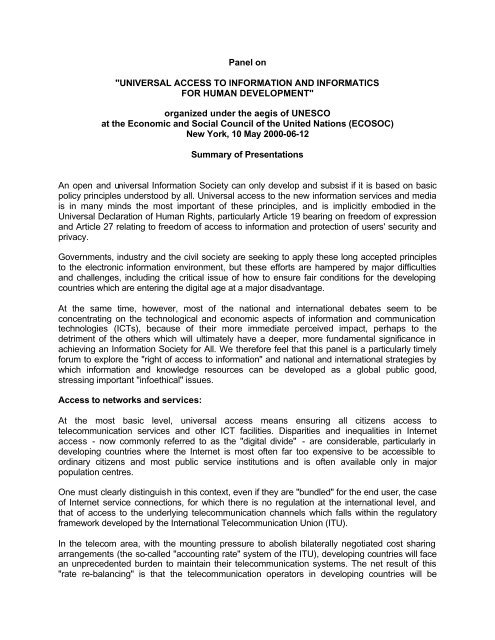
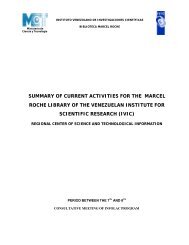
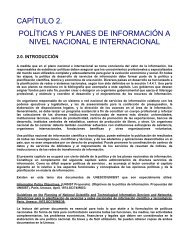
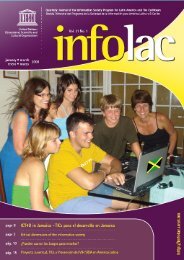

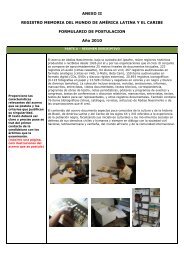

![ifaprep[1]. caribbean - Infolac](https://img.yumpu.com/37304916/1/184x260/ifaprep1-caribbean-infolac.jpg?quality=85)
